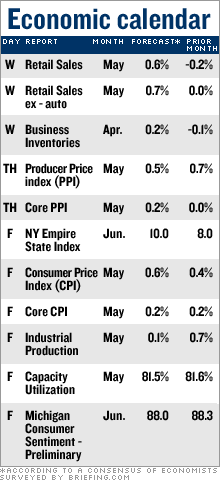Battered bull tries to rechargeA brutal week ended on a high note, but the week ahead could be just as challenging for stock investors.NEW YORK (CNNMoney.com) -- After suffering through the worst week on Wall Street in months, investors would probably appreciate a little peace and quiet. No such luck. The week ahead is shaping up to be just as busy and nearly as volatile.  "Next week is going to be totally unpredictable," said Paul Mendelsohn, chief investment strategist at Windham Financial Services. "It's going to be driven by the Treasury market, the inflation news and the options expiration." In addition, investors will weigh the wisdom of jumping back into stocks now that the battering seems to be done versus waiting to see if another leg down is brewing, considering that stock gains year-to-date are still strong. Since the last big selloff in late February/early March, stocks have pretty much been on the rise, with the blue-chip fueled Dow Jones industrial average, small-cap driven Russell 2000 and broad S&P 500 all hitting all-time highs. The tech-heavy Nasdaq composite hit a six-year high. The runup was fueled by positives including stronger-than-expected quarterly earnings, the enormous amount of corporate deals and stock buybacks and bets that the Federal Reserve would cut interest rates before raising them. But after more than three straight months of gains with little or no rest, Wall Street pros started calling for a pullback. Last week, they finally got it, with the major gauges all shedding at least 3 percent in a three-day period that battered a variety of stocks and sectors. But by the end of the week, the selling seemed to have abated, which could suggest that at least for now, the big pullback is over. However, the worries that caused the selling remain in place and are likely to resurface in the week ahead, keeping investors on edge. Chief among the concerns: the threat of higher interest rates, particularly amid a stronger than expected economy, still-high inflation and an ascendant benchmark 10-year note yield, which is nearing a 1-year high. In particular, the spike in the 10-year note yield spooked investors and is likely to remain a big influence on stocks. That's because it makes the case for the Federal Reserve possibly boosting interest rates later this year and also reminds investors that bonds are a competitive place to put money, too. All of that was underscored by late-week comments from influential PIMCO bond guru Bill Gross, who said that bonds are in a "bear market," meaning prices are likely to keep sliding, pushing the yields even higher. Bond prices and yields move in opposite directions. The challenge for market participants over the short term will be coming to terms with the implications of higher interest rates and what that might mean for the economy. At the last big selloff in February, investors had to digest that global economic and profit growth were going to slow, said Dan Genter, president at RNC Genter Capital Management. The three-month recovery that followed was a transitional period in which the perception switched to a belief that while growth was going to be slower, it was not going to cause a recession, and that earnings growth was not going to slow as much as had been feared, he said. "Now the pendulum has swung again to the realization that not only will there not be a recession, but we could see higher inflation with the stronger economy and the Fed may need to act," Genter said. Higher interest rates slow the flow of money through the economy, eventually dragging on corporate profits and equity prices, a scenario that's bad for stock investors. In addition to what's happening in the treasury market, stock investors will be focused on inflation news in the week ahead, with reports due on both producer prices (PPI) and the more influential consumer prices (CPI). (See chart for details). The week also brings the quadruple options expiration, a quarterly event in which stock index futures and options and individual stock futures and options are all expiring at the same time. Although the actual expiration day is a Friday, it tends to increase volatility in the underlying stocks throughout the week. "It's a big economic week, and you have people positioning themselves ahead of the options," Mendelsohn said. He said that if the inflation reports are positive, oil prices stabilize, and the 10-year note yield pulls back, stocks could do very well during the week and through the options expirations. However, if the inflation number is worrisome, oil prices and the ten-year note yield jump, stocks are going to be in for more trouble. In addition, earnings reports are due in the week from Lehman Brothers (Charts, Fortune 500), Bear Stearns (Charts, Fortune 500) and Goldman Sachs (Charts, Fortune 500). |
|
